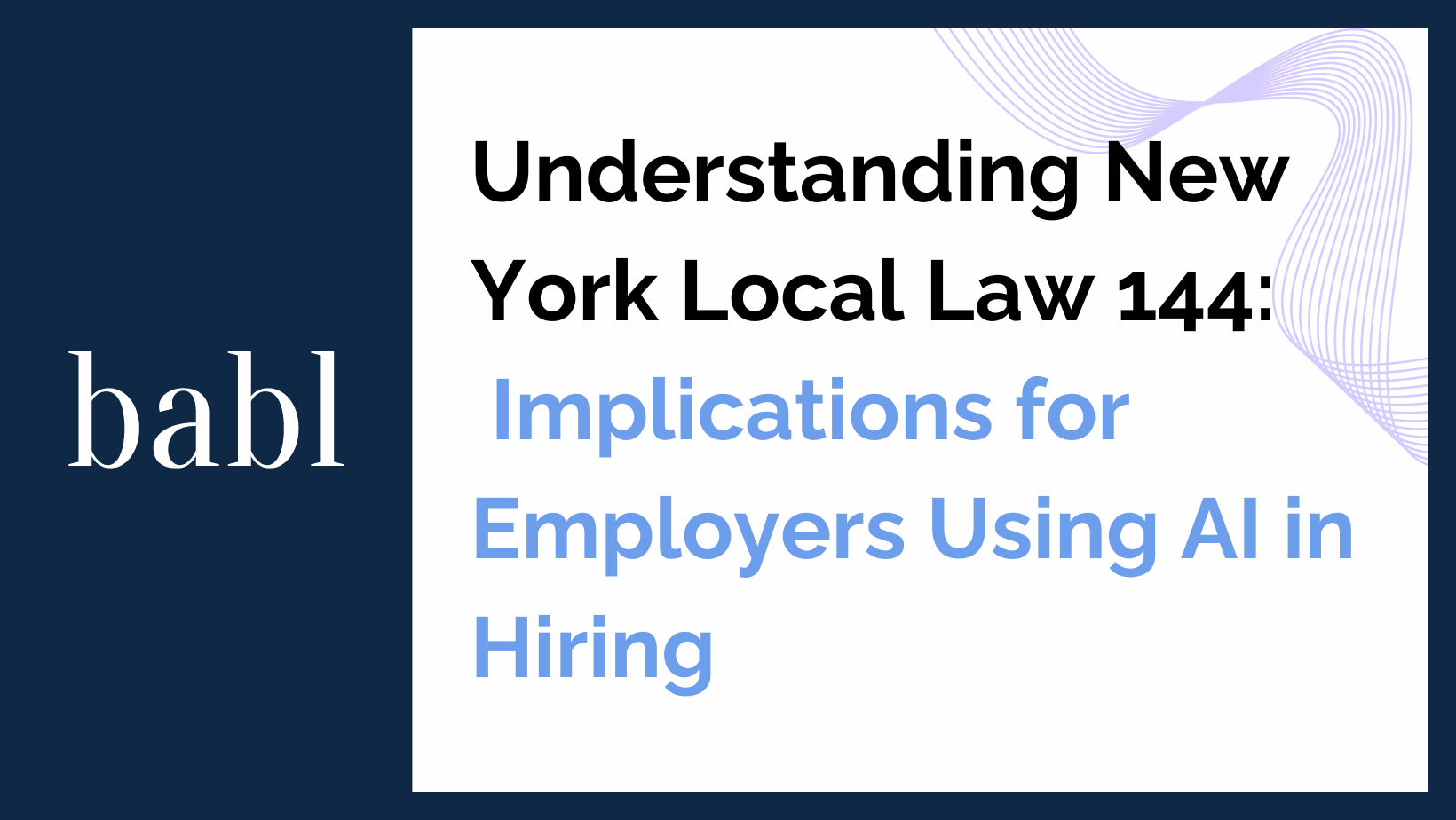Understanding New York Local Law 144: Implications for Employers Using AI in Hiring
As the integration of Artificial Intelligence (AI) into various sectors accelerates, its use in hiring processes has come under increased scrutiny. This scrutiny has led to specific legislative actions aimed at ensuring fairness and transparency in employment. One such legislative milestone is New York City’s Local Law 144, which significantly impacts how employers in the city use AI-driven tools for hiring.
What is New York Local Law 144?
Local Law 144, enacted in New York City, targets the use of Automated Employment Decision Tools (AEDTs) in hiring practices. This law was introduced as part of a broader initiative to address potential biases and discriminatory practices that could arise from the unchecked use of AI in employment decisions. Under Local Law 144, any employer in New York City using AEDTs to screen candidates must ensure these tools are audited for bias and certified for compliance annually.
Key Provisions of Local Law 144
Local Law 144 mandates several critical requirements aimed at regulating the deployment of AEDTs:
-
- Bias Audits: Employers must conduct an independent bias audit of their AEDTs before use and annually thereafter. This audit aims to assess and mitigate any discriminatory impacts that these tools might have based on gender, race, or other protected characteristics.
-
- Certification: Post-audit, employers must obtain a certification demonstrating that their tools have passed the bias audit. This certification must be submitted to a designated city agency and renewed annually.
-
- Transparency and Disclosure Requirements: Employers are required to publicly disclose the use of AEDTs in their hiring processes. This disclosure must include details about the type of tool used, the kind of data it processes, and a summary of the bias audit results.
-
- Data Handling and Privacy: The law also stipulates guidelines for handling the data used by AEDTs, emphasizing the need for privacy safeguards and the ethical use of candidate data.
Implications for Employers
The implementation of Local Law 144 carries significant implications for employers in New York City:
-
- Enhanced Scrutiny of AI Tools: Employers must now examine their hiring processes more closely, ensuring any AI tools used are free of biases that could lead to discriminatory outcomes. This requirement places a higher burden on HR departments to understand deeply the mechanics of the AI tools they employ.
-
- Operational Adjustments: Compliance with Local Law 144 may necessitate changes to existing operational practices. Employers might need to alter their data collection and processing methods, implement new software systems, and possibly adjust their hiring criteria.
-
- Cost Implications: The requirement for annual audits and certifications can introduce additional costs. These costs include fees for independent auditors, investments in compliant AI technologies, and potential modifications to existing systems.
-
- Legal and Reputational Risks: Non-compliance with Local Law 144 can lead to legal penalties, including fines and restrictions on the use of AEDTs. Moreover, failure to comply can damage an organization’s reputation, especially in an era where ethical considerations are increasingly influencing consumer and job seeker behavior.
Compliance Strategies for Employers
To meet Local Law 144 requirements, employers should take proactive and strategic steps.
-
- Choose a Qualified Auditor: Select an independent auditor experienced in both AI and employment law. A reputable auditor strengthens the validity of audit findings and certifications.
-
- Prepare Representative Data: Provide balanced datasets that reflect all applicant groups. This ensures a fair and accurate audit process.
-
- Implement Audit Recommendations: Act promptly on auditor feedback. This may involve revising algorithms, retraining models, or adjusting broader recruitment practices.
-
- Document Everything: Keep thorough records of each audit, its findings, and corrective measures. Proper documentation supports annual recertification and demonstrates compliance during inspections.
-
- Monitor Continuously: Regularly evaluate AEDT performance to identify emerging biases or data drift. In addition, ongoing internal reviews can help prevent compliance gaps and maintain fairness over time.
Embracing Ethical AI in Hiring
New York City’s Local Law 144 represents a major step toward ethical AI governance in employment. It encourages companies to review how automated tools influence hiring and to align those tools with fairness and transparency principles. By embedding compliance and accountability into their processes, employers not only meet legal standards but also strengthen public trust. As AI reshapes recruitment across industries, similar regulations will likely emerge worldwide. Ultimately, Local Law 144 sets a precedent for responsible innovation that prioritizes both efficiency and equality.
Need Help?
The details of NYC Local Law 144 can be overwhelming, so don’t hesitate to reach out to BABL AI. Their team of Audit Experts can provide valuable insights on NYC Local Law 144 and other global regulations.





